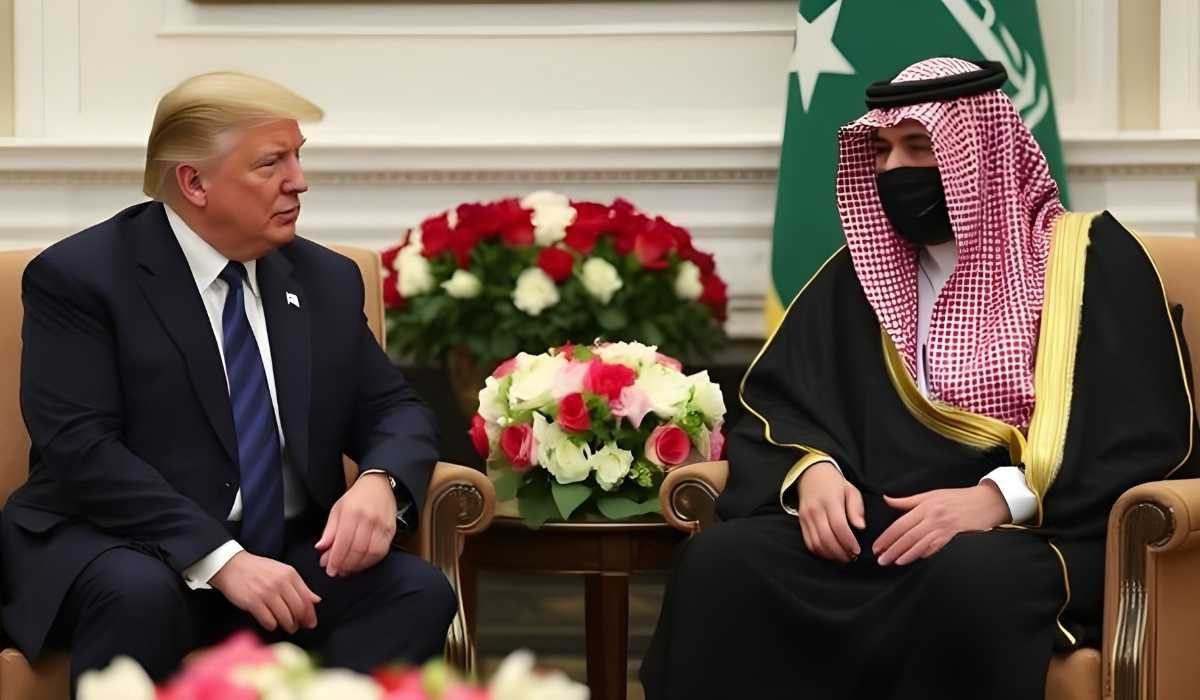The political landscape shifted dramatically this week as President Donald Trump met with Ahmed al-Shara, the newly installed Syrian president and leader of the rebel faction that ousted Bashar al-Assad. This unexpected encounter, held in Saudi Arabia on Wednesday morning, reflects a significant turn in U.S.-Syria relations and raises questions about the implications for international diplomacy, regional stability, and U.S. foreign policy.
This blog dives into the events leading to the meeting, the symbolism behind Trump’s decision to engage, and the broader geopolitical consequences.
Table of Contents
Events Leading to the Meeting
Ahmed al-Shara’s Rise to Power
Ahmed al-Shara, once a high-ranking member of an Al Qaeda branch, has dramatically branded himself. After severing ties with the jihadist group, his rebel alliance unseated Bashar al-Assad in December, a monumental shift in Syrian politics. Since taking office, al-Shara has focused on rebuilding Syria’s global image, including lobbying to remove international sanctions imposed during Assad’s regime.
The Role of Sanctions and Syria’s Economic Collapse
Syria’s economic spiral has been fueled by sanctions placed in response to the Assad government’s brutal crackdown on protests in 2011. Despite European efforts to ease restrictions, the U.S. maintained stringent economic barriers under President Trump’s administration. The meeting between Trump and al-Shara came just a day after Trump’s unexpected decision to lift U.S. sanctions, signalling a change in Syria.
Trump reportedly arrived at this decision following consultations with key regional leaders, including Turkey’s President Recep Tayyip Erdogan and Saudi Crown Prince Mohammed bin Salman.
The Meeting and Its Context
Diplomatic Setting
The meeting occurred in Riyadh, ahead of Trump’s summit with leaders from six Arab countries during his Middle East tour. While details of the discussion remain sparse, the closed-door session was symbolic. It marks a turning point in how the U.S. approaches Syria, now under the leadership of a former rebel.
The meeting follows the Trump administration’s focus on fostering relationships with Gulf leaders. Trump has cultivated strong personal bonds with figures such as Crown Prince Mohammed bin Salman and Sheikh Mohammed bin Zayed of the UAE, avoiding public criticisms of their domestic policies and emphasizing strategic partnerships.
Shara’s Efforts to Moderate His Image
Shara has worked relentlessly to distance himself from his militant past, focusing on appearing as a pragmatic and reform-focused leader. His administration has pledged to tackle terrorism, rebuild Syria’s decimated infrastructure, and participate in regional collaboration efforts.
The U.S. Administration’s Perspective
Initially, the Trump administration approached Shara’s government with caution. Concerns over his prior connections with extremist groups and his long-term goals fueled scepticism. However, Shara’s steps toward addressing counterterrorism measures and advocating for economic reform appear to have warmed attitudes in Washington.
Trump’s decision to lift sanctions may also be viewed as a gamble aimed at encouraging closer alignment with U.S. interests and securing stronger influence in the Middle East.
Bigger Implications on International Relations
The meeting may signal broader shifts in U.S. foreign policy. Here are some key implications:
- New Alliances in the Middle East: By engaging with Syria, the Trump administration is broadening the U.S. network of strategic partners in the region. This relationship could pave the way for greater U.S. involvement in rebuilding Syria post-conflict.
- Challenges to European Influence: The decision to lift sanctions and endorse Shara could strain relations with European leaders who remain sceptical of Syria’s political transformation under his leadership.
- A New Chapter in Terrorism Prevention: Given Shara’s history, the U.S. may seek to utilize his administration’s position to address lingering counterterrorism challenges in the region.
- Economic Benefits or Risks: Sanction removal could provide much-needed financial relief to Syria, but the move may face criticism from factions wary of empowering Shara’s administration prematurely.
Potential for Future Engagement
Trump’s openness towards dialogue extends beyond Syria. He has indicated a willingness to attend a meeting between Ukrainian and Russian leaders in Turkey, raising the stakes for global diplomacy. These engagements underscore a pattern of direct, often controversial, involvement in high-stakes negotiations.
Summit with Gulf Leaders
While in Riyadh, Trump also met with Gulf leaders on his Middle East tour. Notable attendees included:
- Sheikh Tamim bin Hamad al-Thani of Qatar
- Sheikh Mishal Al Ahmed Al Sabah of Kuwait
- King Hamad bin Isa Al Khalifa of Bahrain
Oman and the UAE were represented by high-ranking members of their royal families, rather than their heads of state.
The summit emphasized economic collaborations, including defence equipment deals and investments in AI infrastructure.
What This Meeting Means for Stability and Politics
The meeting between Trump and Shara is a watershed moment in Syria-U.S. relations. By engaging with the new Syrian administration, the U.S. has signalled interest in reshaping the narrative in the Middle East. Whether this gamble will stabilize or further complicate the region remains to be seen.
FAQs
Why did Trump meet with Ahmed al-Shara?
The meeting marked a shift in U.S. policy toward Syria, focusing on rebuilding diplomatic ties after the Assad regime was toppled. It also followed Trump’s decision to lift sanctions on Syria.
What is Ahmed al-Shara’s background?
Al-Shara was previously linked to an Al Qaeda branch before leading a rebel alliance that overthrew Assad in 2023. He has since moderated his image and sought to reestablish international relations.
What could lifting sanctions mean for Syria?
Removing economic sanctions may help Syria’s struggling economy. However, it carries the risk of empowering Shara’s administration prematurely without sufficient proof of reform.
Did the meeting have broader implications?
Yes, the meeting has implications for U.S. foreign policy, regional alliances, and counterterrorism efforts. It also raises questions about the U.S. approach to international sanctions.
Final Thoughts on U.S.-Syria Relations
Trump’s meeting with al-Shara marks a dramatic shift in the narrative surrounding Syria. For those observing, it raises important questions about U.S. foreign policy priorities and the broader dynamics of international power in the Middle East. It is now a waiting game to see if this decision fosters stability or sows new tensions in the region.

